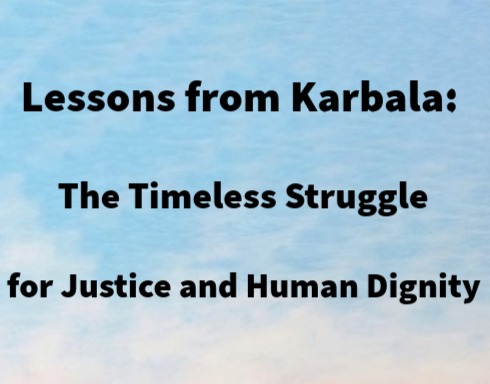By Ayesha Sultana
The message of Karbala is a profound and timeless lesson that reverberates through history, inspiring millions of people worldwide. On the 10th of Muharram in the year 680 CE, Imam Husain ibn Ali, the grandson of Prophet Muhammad ﷺ, along with his family and loyal companions, faced a brutal and unjust massacre in Karbala, Iraq. This tragic event is deeply rooted in the Islamic faith and symbolizes the struggle between truth and falsehood, justice and oppression, and the enduring values of sacrifice, resilience, and steadfastness in the face of tyranny.
Imam Husain’s stand in Karbala was not a quest for power or political ambition but a refusal to pledge allegiance to an oppressive ruler, Yazid ibn Muawiya, whose actions contradicted the principles of Islam. As the rightful spiritual leader, Imam Husain sought to uphold the values of justice, equality, and human dignity, which he believed were being eroded under Yazid’s rule.
The great Islamic poet Allama Iqbal eloquently expressed the profound concept of martyrdom and its connection to the love for the Almighty:
Sidq-e-Khalil (A.S.) Bhi Hai Ishq, Sabr-e-Husain (R.A.) Bhi Hai Ishq/
Maarka’ay Wajood Mein Badr-o-Hunain Bhi Hai Ishq
“The truthfulness of Abraham is but a form of Love, and so is the patience of Husain – And so are Badr and Hunayn in the battle of existence.”
Iqbal highlights that the essence of martyrdom and sacrifice is deeply rooted in the love for God. He draws parallels between the unwavering truthfulness of Prophet Abraham (Ibrahim), the patience and sacrifice of Imam Husain, and the pivotal battles of Badr and Hunayn. These historic and spiritual events symbolize the ultimate devotion and commitment to the Almighty, reflecting a profound love that transcends human limitations and stands as a testament to faith and perseverance.
Universal Lessons from Karbala:
- Justice and Resistance: Karbala exemplifies the struggle for justice and the necessity to resist oppressive systems. Imam Husain’s refusal to compromise his principles and submit to tyranny, even at the cost of his life, serves as an enduring example of standing up against injustice.
- Human Dignity: The events in Karbala underscore the importance of human dignity. Imam Husain’s determination to protect the honor and dignity of his family, companions, and community demonstrates the value of preserving human rights, regardless of the consequences.
- Sacrifice and Selflessness: Karbala teaches about ultimate sacrifice and selflessness. Imam Husain knowingly embarked on a perilous journey, aware of the consequences, yet chose the path of sacrifice to safeguard the greater good of society.
- Compassion and Empathy: The tragedy of Karbala evokes a sense of compassion and empathy, reminding us to be mindful of the suffering of others and to act with kindness towards our fellow human beings.
- Perseverance and Steadfastness: The resilience and steadfastness of Imam Husain and his followers in the face of adversity inspire people to endure hardships with fortitude and determination.
- Unity and Community: The aftermath of Karbala united communities and acted as a catalyst for social and political change, sparking a collective consciousness in the pursuit of justice and equality.
- Spiritual Awakening: Karbala holds immense spiritual significance, encouraging individuals to reflect on their actions and beliefs, seeking a deeper connection with the divine.
The message of Karbala is an enduring tale of courage, sacrifice, and resilience, with universal values that transcend time, geography, and religious boundaries. It serves as a beacon of hope, inspiring individuals to strive for justice, resist oppression, and uphold the dignity and rights of all human beings. The tragedy of Karbala remains etched in the collective memory of humanity, reminding us of the enduring power of truth, love, and righteousness in the face of adversity.
Qatl-e-Husain asal mein marg-e-Yazid hai,
Islam zinda hota hai har Karbala ke baad. – Allama Iqbal
“The assassination of Husain is, in reality, the death of Yazid;
Islam is revived after every Karbala.”
This verse encapsulates the essence of Karbala’s legacy, illustrating that the sacrifice of Husain was not in vain. It marked the defeat of tyranny and the perpetual revival of Islamic principles. Karbala’s message continues to inspire and guide individuals towards justice, truth, and righteousness, emphasizing that the spirit of Islam is reinvigorated through acts of courage and sacrifice.




